What Happens if you Smoke Marijuana Before The Gym
Check out my client Ben’s transformation where he lost a lot of weight and gained muscle by implementing the right diet and workout tips in his routine!

A Science-Based review on the effects of working out while high. Discover if Marijuana is good or bad for exercise performance, fat loss, and muscle growth.
Find out exactly what happens to your body when you smoke weed before going to the gym and lifting weights.
The year is 1975, and one of the greatest bodybuilders of all time, Arnold Schwarzenegger, is seen smoking a joint directly after his 6th Mr. Olympia victory.
He later went on to admit that he did in fact smoke marijuana in the 1970’s.
And that raises the question – “how could someone who was so dominant in bodybuilding, a sport that requires you to get to ridiculously low levels of body fat while packing on pound after pound of muscle, win seven Mr. Olympias while using a substance stereotypically associated with making people fat and lazy?


Well, as marijuana legalization efforts grow, with many states already allowing recreational marijuana use, more and more people wonder how weed can affect their weight, body fat percentage, muscle mass, and the overall results they see from exercise.
So today I want to give you guys a non-biased, science-based review of marijuana and how exactly it can help or hurt your muscle-building and fat-loss goals.
A bit of history
First, it’s important to understand that marijuana was originally made illegal not because of any proven harmful effects.
Instead, it was done to suppress certain minority groups and to snuff out competition between the wood industry and the hemp industry. In case you don’t know, hemp is the plant that grows marijuana.

Back in the early-to-mid 1900’s, it was clear that hemp could be used to make all the things that lumbar could.
Except, industrial hemp was lighter, stronger, and less expensive than wood. So, since it posed a serious threat, a smear campaign was created against marijuana and eventually lead to it being criminalized.
Since then, it’s gone from being extremely demonized to having applicable medical uses today.
Medical uses and physiological effects
For example, it’s now commonly used to treat cancer patients to help them relieve nausea and pain, and to counteract a lack of appetite. (1)
Some studies also show that marijuana can slow the growth of tumors, like pancreatic cancer cells for example (2).
Marijuana contains a chemical known as THC which is responsible for most of the physiological effects that produce the high.
These include the increased appetite that causes the so-called munchies or excessive snacking.

Another major cannabinoid in marijuana is CBD, which has been found to have medicinal value for controlling epilepsy and other neurological disorders.
There’s also evidence to suggest that it could even be effective at reducing inflammation.
But even though marijuana has some medical benefits, many doctors and researchers still consider marijuana to be potentially harmful to your health.

For example, researchers found that smoking 3-4 cannabis cigarettes per day could lead to similar risks with respiratory issues as what is seen in people regularly smoking over 20 tobacco cigarettes per day.
Many studies don’t support this view on marijuana being as bad as tobacco. Some studies have shown that marijuana could even improve how strong the lungs are and their capacity. (3)
So, this is a highly debated issue that we won’t have answers to until scientists will be able to freely conduct experiments and research on marijuana.
Potential performance-enhancing effects
With all that said, that doesn’t change the fact that some athletes do indeed use it. And many believe it provides performance-enhancing effects.
For example, one study on French student athletes found that 17.8% of the females and almost 40% of the males had used cannabis more than 10 times, for 30 days. (4)
This may have to do with the fact that many athletes often claim that marijuana helps them focus and concentrate better.
Some athletes also believe that it has a relaxing effect that can help reduce stress and possibly assist with recovery.
It may help with recovery because marijuana is a vasodilator which means that it can widen your arteries and improve blood flow. This can help reduce soreness.

There’s also a common belief shared by runners that smoking marijuana before their run helps enhance the runners’ high. This is a feeling of euphoria experienced after a couple of minutes of running.
For a long time, runner’s high was always associated with a release of endorphins. However, research now shows that endorphins may not be able to reach the brain.
So it may be that endocannabinoids are the mechanism that leads to that runners’ high. And that may be why marijuana amplifies its effect.

There are also other claims about marijuana where athletes say that it helps them get in the zone.
And due to its pain-reducing effects, some athletes believe that it helps them push through the burning sensation felt throughout the body during a workout.
Looking at the evidence
However, science doesn’t fully agree that the physiological effects that lead to improved focus concentration and relaxation come without their share of negative side effects.
For example, research on cyclists found that smoking a cigarette with 1.7% THC (much less than the amount of a regular joint) significantly reduced maximal power output for the cyclists, compared to those that did not smoke.
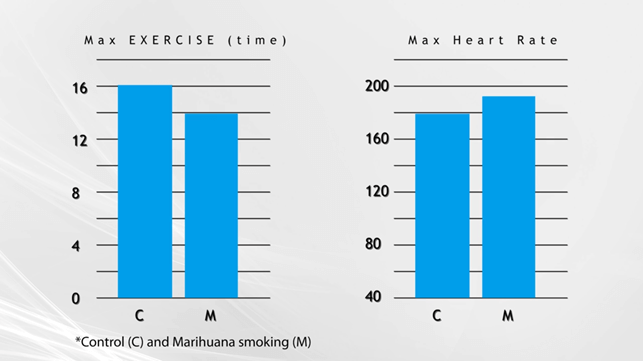
On top of that, research also shows that marijuana can distort perception, coordination, and cognition.
This not only impairs performance but may also increase the risk of injuries when using heavy weights.
Now, combine that with the fact that marijuana can increase your pain threshold like I just said, and it becomes clear that smoking before a heavy lifting session isn’t necessarily the best thing for injury prevention. (5)

With that said, it’s important to note that the loss of coordination highly depends on the dose and your tolerance.
So, either having a high tolerance, or smoking only a small amount of marijuana may not be as detrimental to your coordination, cognition, and performance. (6)
But even with that taken into account, we still have more studies that suggest that THC can significantly reduce many performance measures like balance, reaction speed, and psychomotor performance which is essentially the coordination of your conscious cognitive processing and physical movement. (7)
Marijuana, muscle growth and testosterone
Now specifically about muscle growth, there are definitely some interesting pros and cons.
Unfortunately, there are no direct studies on how marijuana impacts muscle growth. But some studies do show that the THC from marijuana can impair testosterone production. (8)
One study found testosterone levels were 56% lower among men who used marijuana at least four days a week, for at least six months compared to those who had never used it. (9)
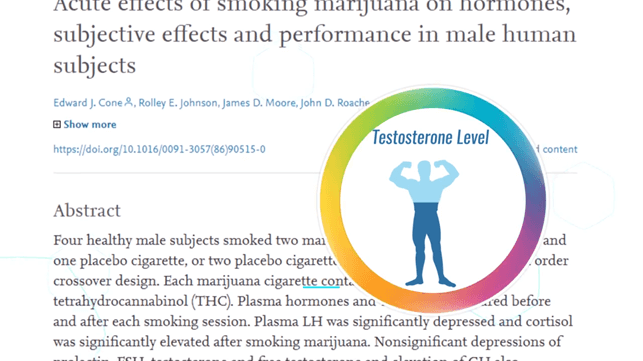
The good news is that some studies suggest the effect isn’t all that significant.
One study even found that there were absolutely no statistically significant changes to testosterone levels during and after the smoking period, as compared with pre-smoking baseline levels. (10)
Also, even if your testosterone levels do in fact drop, the effects are not permanent. Testosterone levels tend to return to normal after around just 24 hours of not smoking marijuana. (11)
Marijuana and growth hormone
Of course, other than testosterone there may be other affected hormones. For example, smoking about two average-sized joints for 14 days may lead to 3 times less human growth hormone production. (12)
Again, this doesn’t directly mean that you can’t build muscle just because you smoke marijuana. Because in general researchers have questioned whether growth hormone has that much of an effect on muscle growth to begin with.
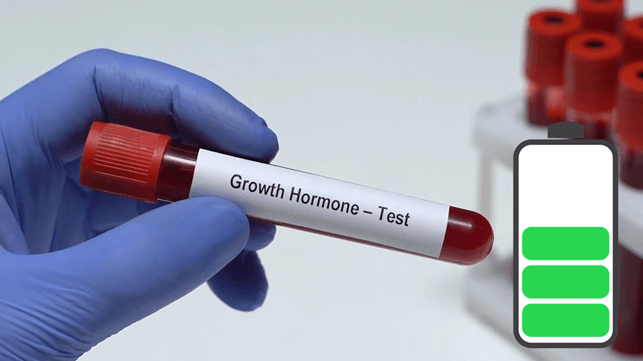
Some studies suggest that the effects of growth hormone on muscle growth are overexaggerated. So, the point is, even if you do experience a reduction in growth hormone, that reduction may not hurt muscle growth. (13)
And regardless, marijuana is not likely to have a significant impact on muscle, especially in non-heavy smokers, since the effects are dose-dependent and quickly reversible.
There is a possibility that it can impair muscle growth more for heavy smokers simply because they’re consuming more of it. But some research shows that that’s also unlikely.

That’s because the testosterone-suppressing effects become less significant as you develop more of a tolerance, through heavy use. (14)
This is similar to what I was saying before. Even if you do smoke a lot, if you have a high tolerance, your performance may not be impaired by much.
And you might not experience such negative effects with your coordination, cognition, and power output while still feeling a sense of relaxation and focus.
Marijuana and appetite – pros and cons
The definitive, most positive thing you could say about marijuana when it comes to muscle growth is that it increases appetite, which can help you eat more food. (15)
This can be useful for those who struggle to eat enough to put on weight, or for those that experience nausea from the amount of food you have to eat sometimes to bulk up.
In fact, one study found that smoking marijuana increased total caloric intake by 40%, which is obviously quite a lot.
But unfortunately that was mainly due to snacking, and even though you probably already know this; cheese and ice cream won’t really help you build muscle anywhere near as they’ll help you gain fat. (16)
And that’s actually the other side of the spectrum of what happens to people that are looking to burn fat and lose weight.

An increase in appetite can be beneficial for people that have a hard time consuming enough calories. But if you get the munchies, you can easily overeat and gain body fat.
If you’re trying to lose weight and you’re limiting your calorie intake then you’re already trying to resist cravings. So when you smoke weed you would think that you would be a lot more likely to binge.
But the interesting thing is that it seems like you’re far more likely to be negatively affected by the munchies regarding fat loss if you’re a light smoker that only occasionally smokes, in comparison to a heavy smoker.

I know that it may not make sense, but studies that looked at chronic marijuana users show a negative correlation between body weight and the amount of marijuana someone smokes.
In other words, the more excess weight that someone carries, the less likely they are to use marijuana. (17)
Further evidence and recommendations
A survey of about 50,000 people confirmed these results. Even after adjusting for factors like age, sex, and tobacco use.
People using marijuana at least three times per week were 40% less likely to be obese. (18)
This is probably because acute marijuana use, or using it every now and then, can be more likely to increase appetite and lead to a binge.
That’s simply because you’re not used to the drug’s effects on your appetite.
Meanwhile, chronic use could lead to a higher degree of tolerance to the THC, which reduces the effect on appetite. (19)
Couple that with the fact that marijuana use increases your heart rate and you’ll see why chronic use may reduce body weight rather than increase it.
Of course, a lot of this does depend on the individual too. There are rumors that some very lean bodybuilders use marijuana without being crippled by the munchies.
Bodybuilding competitors are really only able to use a substance like marijuana to unwind, since it’s calorie-free, unlike alcohol.
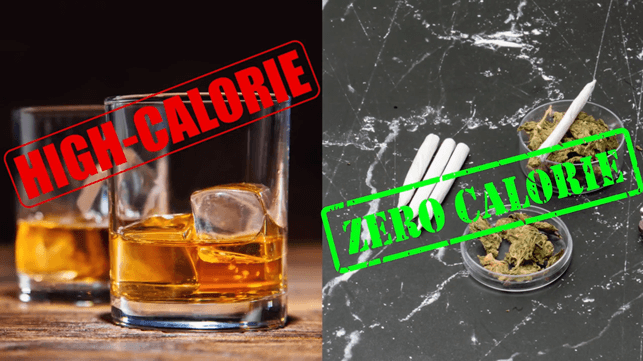
And clearly, some of them are able to control their appetite. Meanwhile others are simply not.
So munchies more than likely affect people on a person-by-person basis. Some people can control it while others will binge.
With all that said, as of now it doesn’t seem that we can conclusively say that marijuana will prevent or slow muscle growth.
And if it helps you increase your appetite and take in the amount of calories you need to bulk up, then it may help you build muscle.
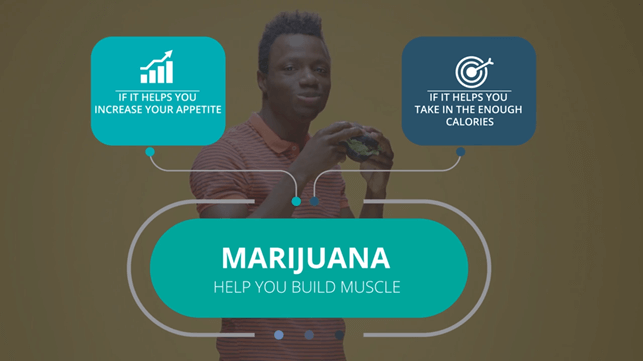
Meanwhile, if you’re trying to burn fat, you don’t smoke that often, and you can’t resist the munchies when you do, you may be better off staying away from it.
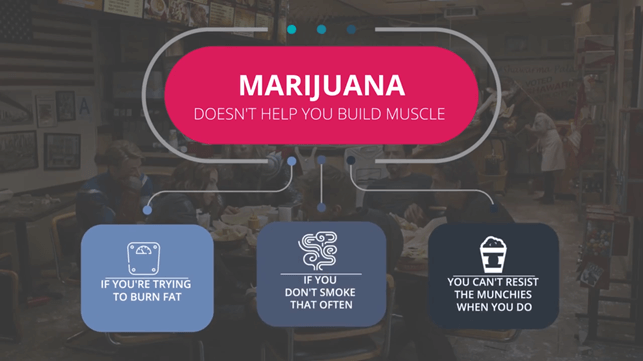
Concluding notes
That about wraps it up, guys. I really hope that you enjoyed this article and that you now understand how marijuana affects performance, muscle growth, and fat loss a little better.
Now, if you’re looking for a done-for-you program that’ll help you develop muscles while helping you burn fat without having to eat bland boring foods all day and you want to do that without having to go through all the grueling trial and error, check out the link below.
We have challenges designed to help you achieve your body transformation goals whether that’s building muscle or burning fat.

You’ll get a customizable meal plan that will change as your metabolism adapts and changes throughout the program. We offer many options including intermittent fasting, keto, one meal a day, carb cycling, vegan, vegetarian, and much more.
You’ll also get a full workout plan with a full video exercise library so you’re never confused.
And also a recipe book that goes hand in hand with your particular meal plan.
You’ll even get an accountability coach that will be there to guide you through the whole process, and much more.
To find out more you can click the link below.
References
- Marijuana is commonly used to treat cancer patients to help them relieve nausea, pain, and to counteract lack of appetite.
https://www.ncbi.nlm.nih.gov/pubmed/25503438
https://www.ncbi.nlm.nih.gov/books/NBK224387/
- Marijuana may slow the growth of tumors, like pancreatic cancer cells.
https://www.ncbi.nlm.nih.gov/pubmed/16616335
- Marijuana may increase lung capacity.
“Recent, larger studies suggest that chronic cannabis users have an increased FVC alone, or in conjunction with an increased FEV1”.
https://www.ncbi.nlm.nih.gov/pmc/articles/PMC5072387/
- 17.8% of the female athletes and almost 40% of the male athletes used cannabis more than 10 times over the course of 30 days.
https://www.ncbi.nlm.nih.gov/pubmed/16022934
(See table 2).
- Marijuana can distort perception, coordination, and cognition. This not only impairs performance but may also increase the risk of injuries when using heavy weights.
https://www.ncbi.nlm.nih.gov/pubmed/11157422
- Having high tolerance or smoking only small amounts of marijuana may not be as detrimental to coordination, cognition, and performance.
https://www.ncbi.nlm.nih.gov/pubmed/18635724
- THC can significantly reduce many performance measures like balance, reaction speed, and psychomotor performance.
“Significant decrements on all the performance measures (general performance, standing steadiness, reaction speed and psychomotor performance)”.
https://link.springer.com/article/10.1007/BF00434409
- Some studies show that the THC from marijuana can impair testosterone production
https://www.ncbi.nlm.nih.gov/pubmed/6090909
https://www.sciencedirect.com/science/article/pii/0091305786905150
- Testosterone levels were 56 percent lower among men who used marijuana at least four days a week for at least six months compared to those who had never used it at all.
“Plasma testosterone — 416 ± 34 ng per 100 ml — was significantly lower in this group than that in the control-group mean — 742 ± 29 ng per 100 ml — for age-matched men who had never used marihuana.”
https://www.nejm.org/doi/pdf/10.1056/NEJM197404182901602
- Some studies suggest the effect on testosterone isn’t all that significant.
“No statistically significant changes in plasma testosterone levels were observed during and after the smoking period as compared with the pre-smoking base-line levels.”
https://www.nejm.org/doi/full/10.1056/NEJM197411142912003
- Testosterone levels tend to return to normal after around just 24 hours of not smoking marijuana:
https://www.sciencedirect.com/science/article/abs/pii/0022519383902552
- Smoking about two average-sized joints for 14 days lead to 3 times less human growth hormone production.
https://www.ncbi.nlm.nih.gov/pubmed/1270583
- Some studies suggest that the effects of growth hormone on muscle growth are overexaggerated.
https://www.ncbi.nlm.nih.gov/pubmed/12663349
- The testosterone-suppressing effects become less significant as you develop more of a tolerance through (heavy use).
https://www.ncbi.nlm.nih.gov/pubmed/12412841
- Marijuana can help increase appetite.
https://www.ncbi.nlm.nih.gov/pubmed/7816872
- “Smoked active marijuana significantly increased total daily caloric intake by 40%”.
https://www.sciencedirect.com/science/article/abs/pii/S0195666388800175
- There is a negative correlation between body weight and the amount of marijuana someone smokes (meaning heavy smokers are not more likely to be overweight).
https://www.ncbi.nlm.nih.gov/pmc/articles/PMC4204468/
- Survey with 50,000 people. It showed that people that used marijuana at least three times per week were 40 percent less likely to be obese.
“The adjusted prevalences of obesity in the NESARC and the NCS-R were 22.0% and 25.3%, respectively, among participants reporting no use of cannabis in the past 12 months and 14.3% and 17.2%, respectively, among participants reporting the use of cannabis at least 3 days per week.”
https://www.ncbi.nlm.nih.gov/pubmed/21868374
- Chronic marijuana use could lead to a higher degree of tolerance to the THC, which reduces the effect on appetite.
https://www.ncbi.nlm.nih.gov/pubmed/23410498
- Additional Research.
https://www.ncbi.nlm.nih.gov/pmc/articles/PMC3023913/
https://www.ncbi.nlm.nih.gov/pubmed/16787229/
https://www.ncbi.nlm.nih.gov/pubmed/22543671
https://www.ncbi.nlm.nih.gov/pubmed/21238476
https://www.ncbi.nlm.nih.gov/pubmed/26588700
https://journals.plos.org/plosone/article?id=10.1371/journal.pone.0144270
My passion for fitness began when I was 14 years old. I naturally fell in love with training and haven’t stopped since. At 18 years I acquired my first personal training certification from ACE after which I opened my first of 3 transformation studios in 2011. I love to share my knowledge through personal training, my online courses, and youtube channel now with over 3,000,000 subscribers! I can happily say that we've helped over 15,000 people get in great shape over the years. I'm always here for my customers so if you need help don't hesitate to send your questions to support@gravitychallenges.com

